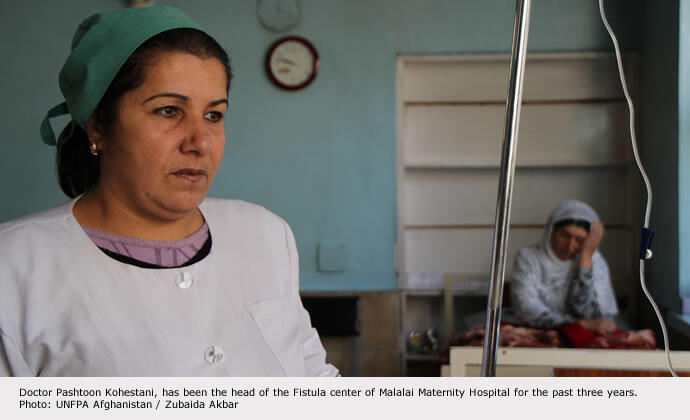Doctor Pashtoon Kohestani, has been working in Malalai Maternity Hospital for twenty years. Since 2009 she is leading the Malalai Maternity Hospital Fistula Centre. For the past three years Ms. Kohestani has assisted more than 400 women suffering of obstetric fistula.
"Women with some of the worst fistula cases have been operated successfully at Malalai Maternity Hospital. I get a lot of satisfaction with the work we are doing at the Fistula Centre. Our patient, Sabza, who was rejected by all hospitals, arrived at the Malalai Maternity Hospital when she had lost all hope of getting any treatment. After her operation, she feels like she was given a new life", said Dr. Pashtoon.
In 2011, seventy five fistula patients were treated at the Fistula Center of Malalai Maternity Hospital. These women had traveled long distances to receive treatment. Most of the women came from the northern provinces of Afghanistan like Faryab, Mazar and Takhar.
A significant number of patients also visited from Herat province. Thanks to UNFPA support, these patients receive free medical treatment and financial support to cover their travel and living costs for the time they need to be under medical treatment in Kabul.
Most of the patients at the Fistula Center are very young women who have been suffering from the condition for two to three years. There are also older women receiving treatment after 10 years or more of living with obstetric fistula.
Usually women are hesitant to visit a doctor when they suffer from obstetric fistula, fearing health and social consequences, because they believe any surgery may cause infertility. This misconception holds many women back from getting treated and starting a new life. "When women with obstetric fistula are referred to us, we are ready to support them in every way possible, not only as doctors but as women who want to help other women get out of this condition. We assure every patient that the operation will not make them infertile and we inform them about family planning options. All these women leave the hospital happy and healthy individuals, and have encouraged other women from their villages to come to us for treatment." said Ms. Kohestani.
Most of the Fistula patients in the Fistula Center of Malalai Maternity Hospital are very young women who have suffered from this condition for two to three years.
UNFPA has brought the crippling and physically and psychologically devastating reproductive health related problem of obstetric fistula to the forefront of national debate, securing obstetric fistula prevention and treatment a place in national health policy and strategy.


